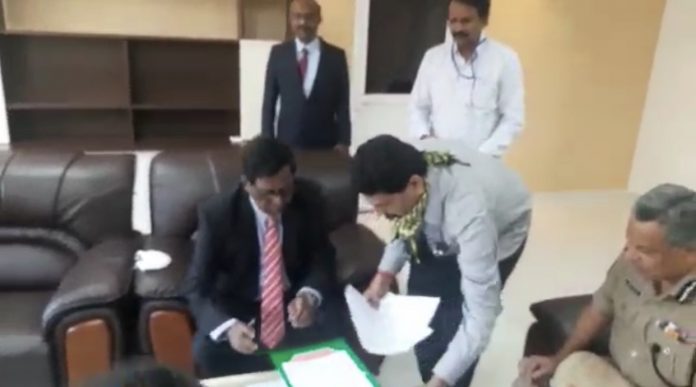Today, Government of Andhra Pradesh appointed Shri Justice V. Kanagaraj, Retired High Court Judge, as State Election Commissioner of Andhra Pradesh State Election Commission.
On Friday, The Andhra Pradesh Government led by YSR Congress Party removed the State Election Commissioner, N Ramesh Kumar by promulgating an ordinance thereby amending Section 200 of the Andhra Pradesh Panchayat Raj Act, 1994 which has reduced the tenure of the State Election Commissioner (SEC) from 5 years to 3 years. N. Ramesh Kumar before he challenges the order of his removal the A.P. State Government appointed Sri Justice V. Kanagaraj as State Election Commissioner.
The order removing N Ramesh Kumar from the post of State Election Commissioner passed by Gopal Krishna Dwivedi, Principal Secretary of the Panchayat Raj and Rural Development Department read “In pursuance of promulgation of Ordinance No. 5 of 2020, Dr N Ramesh Kumar, IAS (Retd), the incumbent State Election Commissioner ceases to hold the office of State Election Commissioner on and with effect from 10.04. 2020.”
Thereafter, three confidential orders were passed which provided that the State Election Commissioner will henceforth have “the status of a Judge of the High Court” which means that a retired Judge of a High Court would now be eligible for appointment to the post of State Election Commission. Moreover, the State Election Commissioner would now have a tenure of 3 years and was to be appointed by the Governor on the recommendation of the State Government.
The conflict between the SEC and the government began when Kumar passed an order postponing the local body elections by six weeks amid COVID-19 Pandemic. Challenging the postponement of the elections, the YSR Congress Party Government moved the Supreme Court. The Supreme Court, however, upheld the decision of the SEC to postpone the elections with a direction to partially lift the model code of conduct.
Article 213 of the Indian Constitution provides the power of Governor to promulgate Ordinances during recess of Legislature which says
“If at any time, except when the Legislative Assembly of a State is in session, or where there is a Legislative Council in a State, except when both Houses of the Legislature are in session, the Governor is satisfied that circumstances exist which render it necessary for him to take immediate action, he may promulgate such Ordinance as the circumstances appear to him to require.”
Hence, the Governor is empowered to promulgate ordinance when the conditions are necessary for promulgation of an ordinance which require that an immediate action ought to be taken. In the present case the promulgation of ordinance removing the SEC and reducing the tenure at a time when the entire world is facing a crisis situation owing to the spread of COVID-19 is the question which the court will be required to decide.
The Supreme Court in T.N Seshan, Chief Election Commissioner Vs Union of India had observed “We may incidentally mention that the decisions taken by the CEC from time to time postponing elections at the last moment, of which he has made mention in his petition, have evoked mixed reactions. This we say because the CEC uses them to lay the foundation for his contention that the entire exercise was mala fide. Some of his other decisions were so unsustainable that he could not support them when tested in court. His public utterances at times were so abrasive that this court had to caution him to exercise restraint on more occasions than one. This gave the impression that he was keen to project his own image. That he has very often been in the newspapers and magazines and on television cannot be denied. In this backdrop, if the Government thought that a multi-member body was desirable, the Government certainly was not wrong and its action cannot be described as malafide. Subsequent events would suggest that the Government was wholly justified in creating a multi-member Commission.”
-India Legal Bureau


